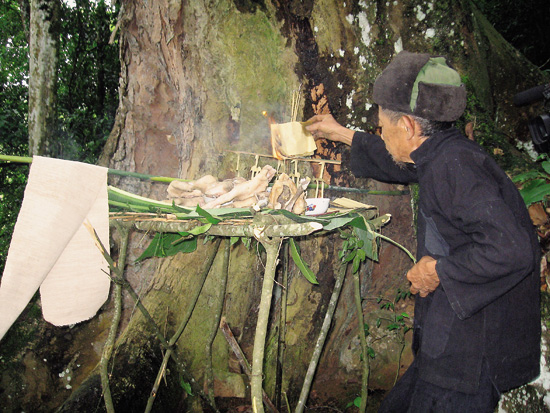
Shaman Giang Lo Pang, 70, of the Thu Lao people’s La Ho village, Ta Gia Khau Commune, Muong Khuong District, Lao Cai Province,
supplicates the forest god. The cloth is offered for good luck, longevity and health. The
offerings include chicken, pork, rice and liquor
Photo: Nguyen Ngoc Thanh
Vietnam Heritage, March 2011 — The Thu Lao, a branch of the Tay ethnic minority in Muong Khuong District of the northwestern province Lào Cai, believe the forest is the protector and soul of every living thing. Thu Lao always live near old forests. They hold worship rituals every year to pray to the god of the forest for good health for the villagers and their animals, good harvests and protection against bad luck.
An annual forest-worshipping ritual is one of the Thu Lao’s biggest events of the year.
The village elects a host, typically the village patriarch. Usually, each household contributes one bowl of rice, one bottle of liquor and VND10,000 ($0.50) so the host can buy things such as pigs, chickens and vegetables as offerings.
On the morning of the second day of the second lunar month (6 March this year), everyone gathers to get firewood ready, slaughter pigs and chickens and cook. The host is the one who ritually slits the animals’ throats. The Thu Lao believe the animals are offered to the god of the forest in the process.
The offerings include a whole boiled pig, five boiled chickens, five bowls of rice and five pairs of chopsticks. The host and his assistant wear traditional clothes of the Thu Lao, burn three incense sticks and pour liquor into five cups on the altar. The host kneels in front of the altar and says prayers.
The host stands, takes the liquor from the altar and gives it to the assistant to scatter from a bowl around the altar while the host holds a pair of chopsticks and points to every offering on the altar. He says the name of each offering he points to; only then, it is believed, will the god of the forest accept the offerings. Then, the host and his assistant wait for about an hour for the god to enjoy the offerings on the altar.
The host then states the rules and regulations on what to do to protect the forest. For instance, villagers are not allowed to cut down trees or let their cattle go free in it.
The host asks people to take the offerings off the altar and everybody eats and drinks. The offerings are included in the feast.
Afterward, the host asks everyone to clear and clean the area; but the altar is left until it is time to make a new one for the same day next year.
* The author worked for the Deparment of Culture, Sport and Tourism of Lào Cai Province from 2002 and 2009, specializing in ethnic-minority culture

